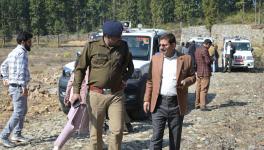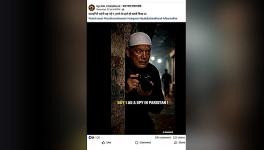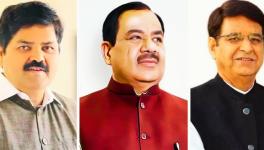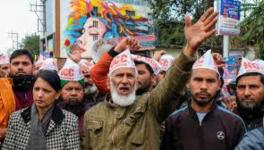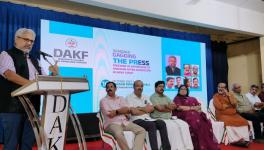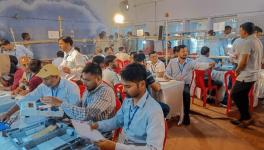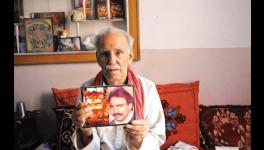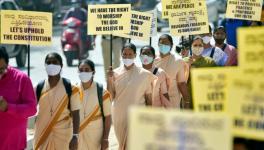In Uttarakhand, Communal Campaign Marches on After BJP’s Win
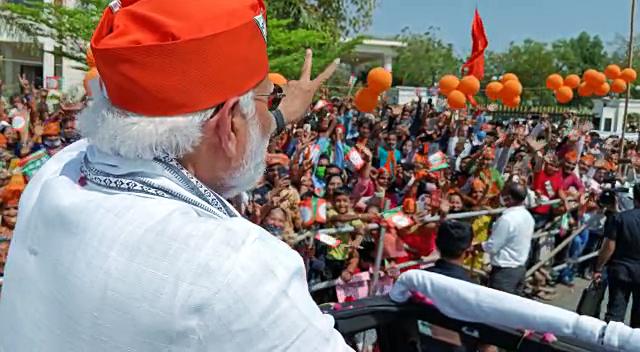
Dehradun-based lawyer Razia Baig, a former member of the Uttarakhand minority panel, was in Dak Pathar, a holiday resort, when she got caught in the “victory parade” of the Bharatiya Janata Party legislator Munna Singh Chauhan. Amidst cries invoking Lord Rama, a large crowd openly chanted anti-Muslim slogans as it celebrated the party’s return to power in the recent Assembly election. “They were far more intimidating and menacing than anything we have yet heard from the BJP stables,” she says.
Whatever constitutional proprieties still exist, they were missing in this parade. The Uttarakhand Police did not even pretend to try to stop the chanting. “It was a very frightening experience”, recalls Baig, a former chairperson of the Uttarakhand Bar Council who presently runs a law firm in Dehradun.
As the communal divide deepens with every passing day, Uttarakhand is engulfed by hate rhetoric. It is much to the despair of the Muslim communities, which comprise less than 14% of the state’s population. For the first time, the community is at the receiving end of an openly communal campaign that even Prime Minister Narendra Modi participated in. He subtly warned voters during the election campaign that his party’s challenger, the Congress party, planned to settle the Rohingya Muslims in their “devbhoomi” to destroy their culture and religious traditions.
“Although adjacent to Uttar Pradesh, Uttarakhand Muslims had not been subjected to [that kind of] hate propaganda. But this time, it was a no-holds-barred campaign. Infighting in the Congress party made things worse for them,” said a visibly disturbed Baig.
The venom of hatred is now coursing through the veins of the body politic. “The BJP needs us to win elections,” says Baig. We are the hate objects they need to keep their propaganda machinery and hate campaign alive. If we were not here, there was little likelihood they would win a single election,” she says.
The current process of communalisation of Uttarakhand began in 2017 when Trivendra Singh Rawat was chief minister. That year, in Raiwala town near Rishikesh, following the murder of a local Hindu man, Muslim shops on the main road between Rishikesh and Haridwar were targeted and burnt by alleged Vishwa Hindu Parishad and Bajrang Dal mobs. As the momentum of this campaign picked up, it often manifested in the form of rumours. As there was never any counter-narrative by the authorities to control the violence and hate, mobs felt emboldened to attack small businesses owned by Muslims.
Political analyst SMA Kazmi says anti-Muslim rumours were being spread via Facebook posts. “A mobile phone store was targeted because the looters claimed he had saved numbers of Hindu girls on his cellphone. A Muslim barber’s shop was attacked because it did not have ’a Jai Shri Ram’ slogan outside,” said Kazmi. In 2020, mob violence erupted in Ghansali town following rumours that a Hindu girl had eloped with a Muslim boy. “All the Muslims living in that town were asked to leave. After another rumour of rape, Muslim-owned shops were burnt in Agastmuni near Rudraprayag,” says Kazmi.
The situation in Augustmuni came under control only after the district magistrate intervened to declare the rumours were “baseless”. These are just a few instances where the minority community has been attacked in recent years. Politicians spread this hate discourse freely in the state. For example, BJP Member of Legislative Assembly from Badrinath, Mahendra Bhatt, told people not to buy vegetables from Muslims but Hindu traders in a Facebook post.
The culmination of this hate campaign was the so-called Dharam Sansad held last year in Haridwar, where Hindu sants led by Narsinghanand Saraswati gave a call to “exterminate the 20 million Muslim population”.
Dehradun-based Nasreen Jahan Begum, a housewife, admits she is scared of the rising litany of hate. She says, “What is the ultimate objective of this hate campaign? The government has already achieved its goal of communal polarisation. I never thought that in the villages of Garhwal and Nandprayag in the Tehri district, where Muslims have been living for generations, we would be at the receiving end of such hate.”
Nasreen says that in Dehradun, she knows of people who do not want Muslim tenants. “And there is growing institutional discrimination,” she says. She is far more concerned about rising unemployment, especially amongst the educated youth, but the ruling party's priorities are at odds with real issues. “After getting an M-Tech degree, the only job avenue open for young people is to sell vegetables. Is that a viable option?” she asks.
Many in Uttarakhand had hoped the situation would be calmer once the BJP recorded a victory in the Assembly election. “But the anti-Muslim hysteria that has been deliberately whipped by [the movie] Kashmir Files belied such a hope. Will such a movie be allowed to be made on the Hashimpura riots or the Godhra riots?” she asked.
Educationist and agriculturist Fazi-ur-Rehman from Manglaur near Roorkee town is a diehard Congressman. Today, he fears that the hate propaganda will only increase since the BJP has returned to power against all odds. “There was a strong anti-incumbency wave in Uttarakhand, yet in the last days of the election campaign, the BJP could swing people in their favour,” he says. He believes it happened after Congress leader Harish Rawat stepped on a minefield by denying he had wanted Jumma (Friday) to be a holiday for Muslims.
The BJP weaponised Rawat’s comment since the word “Muslim” is all it needs to start targeting critics and rivals. Its leaders painted Rawat and other Congress party leaders as anti-nationals determined to promote Muslim interests at the cost of the Hindus. The BJP even released a letter allegedly sent during Rawat’s tenure as chief minister. In it, a Muslim youth apparently requests Rawat to set up a Muslim University in Uttarakhand. “The Congress should have firmly rebutted this campaign but it did not,” said Fazi ur-Rehman. “A dark future awaits us and our families,” he said.
A Muslim professor in Ranikhet who did not want to be identified said, “We have been made second-grade citizens. The next steps will be to make us pariah and take away our citizenship.” His comment is a clear reflection of the fear the community confronts today.
Bilal Quereshi, a fruit-seller who follows political developments closely, said, “Even the United Nations Human Rights chief has raised concerns about the targeting and harassment of minorities in India. Obviously, we are scared and pained. The problem is, we are not in a position to file an FIR against our oppressors because the administrative machinery is not sympathetic towards us at all.”
Despite achieving a high pitch of communal polarisation, the ruling dispensation wants to keep up the pressure. The worst part about majoritarian violence is that it tarnishes the Muslim community, which amounts to collective targeting and punishment. It, in turn, sparks all kinds of violence. And when targeting goes unpunished, it subverts the rule of law, which is a right of all citizens.
The author is a freelance journalist. The views are personal.
Get the latest reports & analysis with people's perspective on Protests, movements & deep analytical videos, discussions of the current affairs in your Telegram app. Subscribe to NewsClick's Telegram channel & get Real-Time updates on stories, as they get published on our website.









